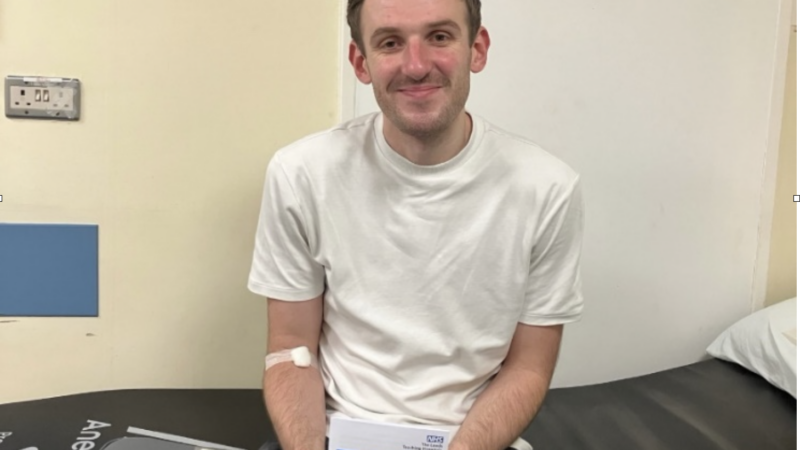When appendix surgery led to complications, Inhealthcare’s virtual ward service at Leeds Teaching Hospitals NHS Trust helped this dad stay close to his young family.
31 year old Adam Etherington from Leeds tells his story of recovery.
What led to your emergency hospital admission?
I’d been feeling unwell for a couple of days with sickness and stomach cramps. I initially thought it was just a virus, but suddenly the pain quadrupled. I was in such agony that I couldn’t think about anything else. My dad rushed me to A&E at St James’s Hospital in Leeds, where I was diagnosed with a ruptured appendix and operated on that same night.
What happened after the surgery?
What I thought would be a straightforward recovery turned into quite a journey. After four days in hospital, I went home thinking I was on the mend. But there was still some infection in my stomach from the rupture, which was larger than anticipated. This led to three weeks of complications – including chest pains, high temperatures, and sickness. I had to be readmitted twice and visited the surgical assessment unit another time.
How did the virtual ward help?
I was monitored on the virtual ward twice during my recovery. The most valuable aspect was being able to input my symptoms through the Inhealthcare app, which helped catch problems early. When I started feeling sick 24 hours after returning home, I could record this along with other vital signs. The monitoring equipment was reliable, and the staff were very responsive when I needed to call them.
What meant the most to you about recovering at home?
Being with my two boys, who are both under two years old. They couldn’t visit me in hospital, which was really difficult. At home, I could see them in the morning, eat my own food, and get proper sleep. Without the virtual ward, I might have had to stay in hospital longer for monitoring, which would have been challenging with such young children.
How did your family respond?
They were naturally worried when my appendix ruptured, especially as there was talk of potentially removing part of my bowel. The subsequent complications were particularly concerning for them. However, the regular monitoring through the virtual ward helped put their minds at ease – they would often ask about my temperature readings and other vital signs.
What would you say to others offered virtual ward support?
I’d definitely say do it. The system is reliable, and you’re only offered it when doctors are confident you’re well enough to be monitored remotely. At the first sign of anything wrong, it’s flagged and addressed. You get the benefits of being at home while maintaining the safety of hospital care.
Now you’re recovered, what do you appreciate most?
Interacting with my kids again. Even being out of action for a month, they changed so much. When you can’t pick them up because you’re recovering, and they don’t understand why – that’s tough. Now, even after a tiring day at work, I look forward to doing bedtime with them. The experience has given me a new appreciation for those everyday moments.
*Adam Etherington, 31, lives in Leeds with his family and works as head of social media for a nutrition company. He was treated at St James’s University Hospital and supported by Inhealthcare virtual ward service in November-December 2024.

